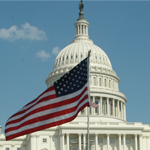BillMoyers.com is proud to collaborate with EveryVoice on a series of op-eds featuring ideas from a variety of viewpoints for making our democracy one that is truly of, by and for the people. Discover more ways to fight back against our broken campaign finance system. It’s a fight we can win.

(Photo: Edward Kimmel/ flickr CC 2.0/ Edited from original)
This post first appeared at The Weekly Wonk.

This emerging state of acceptance is making room for some new approaches: What if we stop focusing on containment, and start focusing on empowerment? What if we stop focusing on limits, and start focusing on opportunities?
Rep. John Sarbanes (D-MD) has been grappling with these questions. His idea: pass a bill that will solve two related problems — voter cynicism and the influence of special interest money — with one set of reforms. First, give every citizen a $25 “My Voice” tax credit (if you contribute $25 to a campaign, you get $25 off your tax bill). Next, create a 6-to-1 “Freedom from Influence” matching fund (for every $1 you spend, the government kicks in $6 in public funding). Then watch political fundraising change for the better.
Right now, Sarbanes explained at a recent event at New America alongside new Federal Election Commission (FEC) chair Anne Ravel, members of Congress are feeling the pressure to raise tons of money, and they know where they can raise it: from lobbyists on K Street. They know if they go to a lobbyist-hosted fundraiser, they can pull in $10,000 – enough to make it worth their time. But try raising that kind of money in an in-district house party. You can’t, at least under the current rules.
But, Sarbanes argues, if Congress passes H.R. 20, the Government By the People Act, that calculus changes. If a constituent can get 30 friends to each pledge $50, that’s $1,500. Then, with the 6-to-1 multiplier, that’s another $9,000, bringing the total up to $10,500. Plus, those K Street fundraisers don’t pay off in the same kinds of bonuses as house parties can. As Sarbanes explains, “If you do a K Street fundraiser, nobody goes and knocks on doors for you, and most of them probably can’t even vote for you. But if you do a house party, people can vote for you, and they can lick envelopes. So you’re matching up the organizing imperative with fundraising.”
H.R. 20 would do more than reduce influence of the special interests who attend those $1,000-a-plate fundraisers in Washington. It will also reduce the widespread political cynicism that Sarbanes contends is behind the recent 36 percent voter turnout rate in the 2014 midterm elections, the lowest level since 1942. “If we’re going to address the cynicism,” noted Sarbanes, “we need to design a solution that brings them out of the bleachers and into the ring, a solution that says they have power, they have voice. And that’s the empowerment strategy.”
Forging opportunity in the face of a post-Citizens United Congress fits in with a broader framework laid out by Mark Schmitt, director of the Political Reform Program at New America in a new paper, Political Opportunity: A New Framework for Democratic Reform. According to Schmitt, it’s time to move beyond the obsession with corruption that has dominated thinking about campaign finance reform for years. Instead, we need to think about campaign finance reform in the context of opportunity.
In Citizens United and the more recent McCutcheon v. FEC decision lifting aggregate limits on individual campaign contributions, the Supreme Court has defined corruption very narrowly as quid quo pro situations. The Court has also taken a very expansive view of the First Amendment, casting wide protections for political speech that include political spending. Rather than fight a battle to limit contributions that will pit campaign reformers against the First Amendment, Schmitt thinks they ought to focus on expanding participation.
“I don’t want to be in a fight with the First Amendment,” Schmitt said. “Thinking in political opportunity gets you out of a trap of where you are restricting the First Amendment.”
Instead, says Schmitt, reformers should be asking, “How do we make it easier for people to organize and to be heard?” He sees promise, for example, in technologies that reduce start-up costs for political organizing, like ActBlue and NationBuilder.
Over at the Federal Elections Commission, new chair Ann Ravel is also trying to dial up the levels of citizen engagement. For years, the agency mostly did little but serve its “clients” (i.e., the two parties and their campaigns). But upon taking over as FEC chair in January 2015, Ravel decided to do something unprecedented. She set out on a “public listening tour” to get outside of Washington and talk to a wider community of Americans about what they thought about regulation of joint fundraising committees. The FEC is now processing 32,000 public comments it received on that question.
“I‘ve worked at every level of government so I have a really a strong feeling about civic engagement,” she said. “We’ve got to bring more people into the dialogue.”
This citizen engagement strategy, particularly when used to court small donors, is not without its critics. One ongoing critique of relying on small donors is that small donors, at least in the current system, often tend to be political ideologues. That trend leaves many asking: won’t moving to small donors just empower extremists?
Sarbanes acknowledges the risk. “There is,” he observed, “a universe of small donors that responds to the light-your-hair-on-fire appeal.”
But, he counters, if Congress changes the political fundraising rules, they will also change the calculus for “the rational small donor who right now isn’t going to give $25 because they’ve figured out that it’s not going to matter.” The prospect of a 6-to-1 match might very well impact how those less ideologically extreme potential donors think about political giving.
While everyone is realistic about the challenges ahead, the call-to-action to seize political opportunity is clear. “Somebody is going to own your government,” Sarbanes said. “Either it’s going to be big money and special interests, or it’s going to be everyday citizens. So let’s design a system that puts you in charge.”


